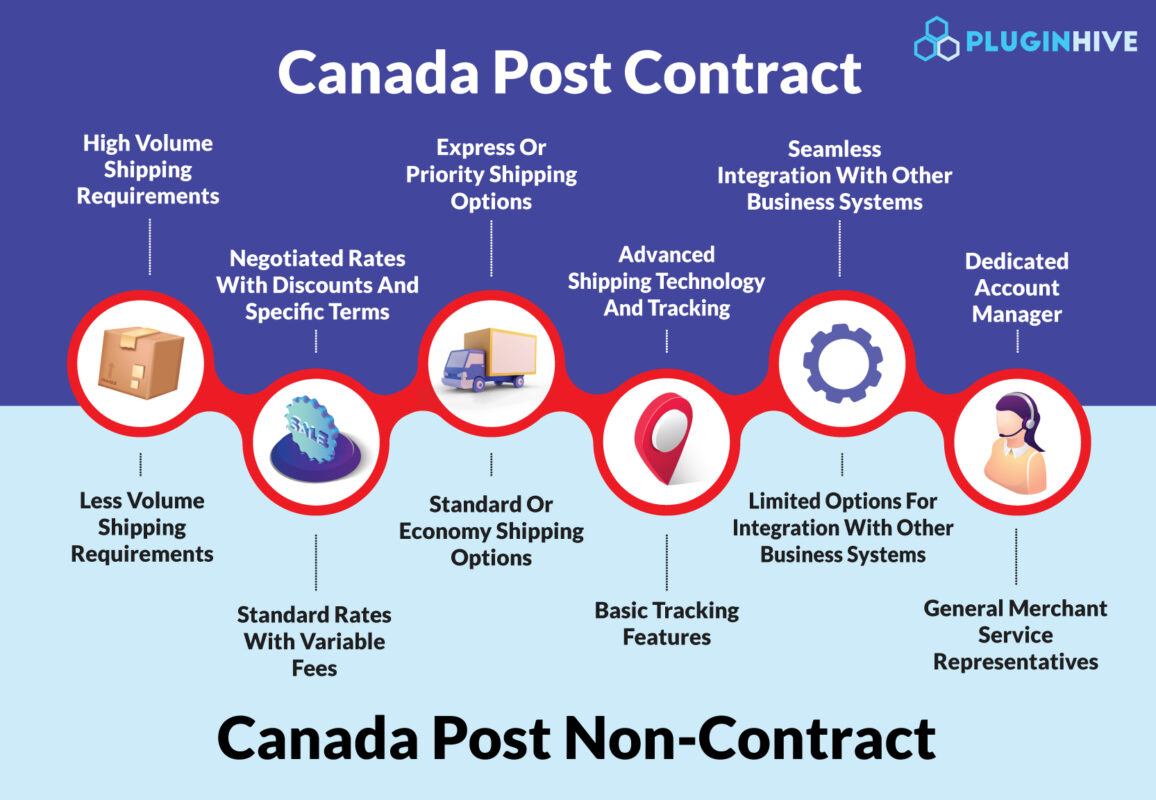With the growing need for on-demand and fast delivery of online products, many eCommerce businesses stress over the entire shipping process. Minimizing the time and cost of sending packages across the country and beyond can seem daunting, but Canada Post (as well as other shipping carriers) tries to make it as streamlined as possible. They offer many services for eCommerce brands to utilize and simplify the shipping process. When signing up with Canada Post small business, you have the choice of whether you want to incur contract or non-contract shipping – but what do they mean and which one is best for your business?
Canada Post Contract Shipping
Contract Shipping with Canada Post is designed for businesses and frequent shippers who have a high volume of shipping needs. To take advantage of this option, merchants can sign up for a Canada Post Commercial Account and negotiate a contract with Canada Post. The terms of the contract will depend on the volume of shipments, the destination, and other factors.
The advantage of contract shipping is that businesses can often negotiate better rates, receive discounts, and have access to additional services that are not available to non-contract merchants.
For example, a company that regularly ships large volumes of packages may be able to negotiate a lower rate per package or have access to expedited shipping options that are not available to non-contract merchants.

Canada Post Non-Contract Shipping
Canada Post Non-Contract Shipping is designed for individuals and businesses who do not have a high volume of shipments. Non-contract merchants can purchase shipping services directly from Canada Post at standard rates without any negotiation. This option is suitable for occasional shippers who do not need additional services or special pricing.
For example, an individual who is shipping a package once in a while to a friend or family member may not require the customization or flexibility that comes with contract shipping.
Difference between Canada Post Contract & Non-Contract Shipping – Explained

The main difference between contract and non-contract shipping is the level of customization, pricing, and services available. Contract shipping offers more flexibility and customization options, while non-contract shipping is more straightforward and generally offers standard pricing.
Additionally, contract merchants typically have access to a dedicated account manager who can assist with shipping needs and answer any questions, while non-contract merchants interact with general merchant service representatives.
Apart from these, there are other differences that set Canada Post Contract Shipping apart from Non-Contract Shipping. These include:
- Canceling Canada Post shipments
- Handling Canada Post Return Shipments
- Advanced Shipping Technology and Tracking Capabilities
- Level of Customer Service and Support
- Range of Shipping Options Available
- Level of Integration with other Business Systems and Processes
- Billing and Invoicing
Now let us cover these differences in detail.
Canceling Canada Post shipments
When it comes to canceling shipments, there may be differences in the types of fees and penalties associated with contract and non-contract shipping. For contract shipping, the terms of cancellation will be specified in the contract that the merchant has negotiated with Canada Post. Depending on the terms of the contract, there may be cancellation fees or penalties for canceling shipments.
For non-contract shipping, merchants can cancel their shipments directly through Canada Post. However, there may be fees associated with canceling a shipment, depending on the type of shipping service selected.
For example, contract merchants may be subject to cancellation fees or other penalties if they cancel shipments outside of a specific time frame, or if they do not meet certain volume or delivery requirements. Non-contract merchants may be subject to different fees or policies, depending on the type of shipping service selected.
Handling Canada Post Return Shipments
Returns can also be handled differently for contract and non-contract shipping. In terms of handling returns, contract merchants may have more control over the return process and may be able to specify the type of shipping service used or the return address. They may also have access to additional return services, such as a dedicated return address, a prepaid return shipping label, automated returns management or specialized packaging materials.
Non-contract merchants can still use Canada Post for return shipping, but may not have access to the same level of customization and services as contract merchants. Depending on the type of shipping service used, the merchant may have to pay for the return shipping or may be able to use a prepaid return shipping label.
Advanced Shipping Technology and Tracking Capabilities
There are other factors that can distinguish contract and non-contract shipping with Canada Post. For example, contract merchants may have access to more advanced shipping technology and tracking capabilities. This can include features like real-time tracking updates, customized tracking reports, and automated shipping systems that integrate with the merchant’s existing technology infrastructure.
Non-contract merchants, on the other hand, may have access to more basic tracking features, such as email notifications or tracking through the Canada Post website.
Level of Customer Service and Support
Another difference between contract and non-contract shipping is the level of merchant service and support. Contract merchants typically have a dedicated account manager who can assist with any shipping needs or issues.
Non-contract merchants interact with general merchant service representatives. This can affect the level of personalized support and attention that merchants receive, especially when dealing with complex or time-sensitive shipping needs.
Range of Shipping Options Available
Another factor that can distinguish contract and non-contract shipping with Canada Post is the range of shipping options available. Contract merchants may have access to a wider range of shipping options, such as express or priority shipping, that are not available to non-contract merchants. This can be important for businesses that need to meet specific delivery timelines or have urgent shipping needs.
In addition, contract merchants may be able to negotiate specific terms and conditions related to shipping, such as packaging requirements, insurance coverage, and liability for lost or damaged packages. This can be particularly important for businesses that are shipping high-value items or sensitive materials.
Non-contract merchants, on the other hand, may have access to more basic shipping services that are suitable for simple or occasional shipments. These services may include standard or economy shipping, as well as options for tracking, insurance, and proof of delivery.
Level of Integration with other Business Systems and Processes
Another key difference between contract and non-contract shipping is the level of integration with other business systems and processes. Contract merchants may be able to integrate their shipping data with other business systems, such as inventory management or order fulfillment, to streamline operations and reduce manual data entry.
Non-contract merchants may have more limited options for integrating shipping data with other systems, which can create additional manual work and potential errors.
Billing and Invoicing
When it comes to billing and invoicing, there can be differences between contract and non-contract shipping as well. Contract merchants may have more customized billing options, such as invoicing based on specific shipping volumes or delivery locations.
Non-contract merchants typically receive standard invoices based on the shipping services used, with no negotiation or customization available.
CanadaPost Contract or Non-Contract Shipping on Shopify and WooCommerce
For Canadian business owners who are looking to use Canada Post to fulfill shipments on their Shopify or WooCommerce stores can integrate with PluginHive Shipping Solutions.
PluginHive Shipping Solutions are officially certified by CanadaPost for both WooCommerce and Shopify. With these solutions, merchants can integrate their Contract & Non-Contract Canada Post accounts.

With Pluginhive merchants can get the following benefits:
- Seamless integration of Canada post Contract and Non-Contract accounts
- Convenience of getting accurate shipping rates from Canada Post
- Increased cart conversion by displaying delivery date and time
- Automated order fulfillment of 100s of orders in a single click
Conclusion
Overall, the differences between contract and non-contract shipping with Canada Post can depend on a variety of factors, including the merchant’s shipping needs, volume, and budget. merchants should carefully evaluate their options and work with their Canada Post representative to understand the different features and services available to them. By selecting the right shipping option, merchants can ensure that their packages are delivered quickly, safely, and at a fair price.
Reach out to PluginHive’s customer support team to learn more about how to integrate PluginHive into your eCommerce website.

